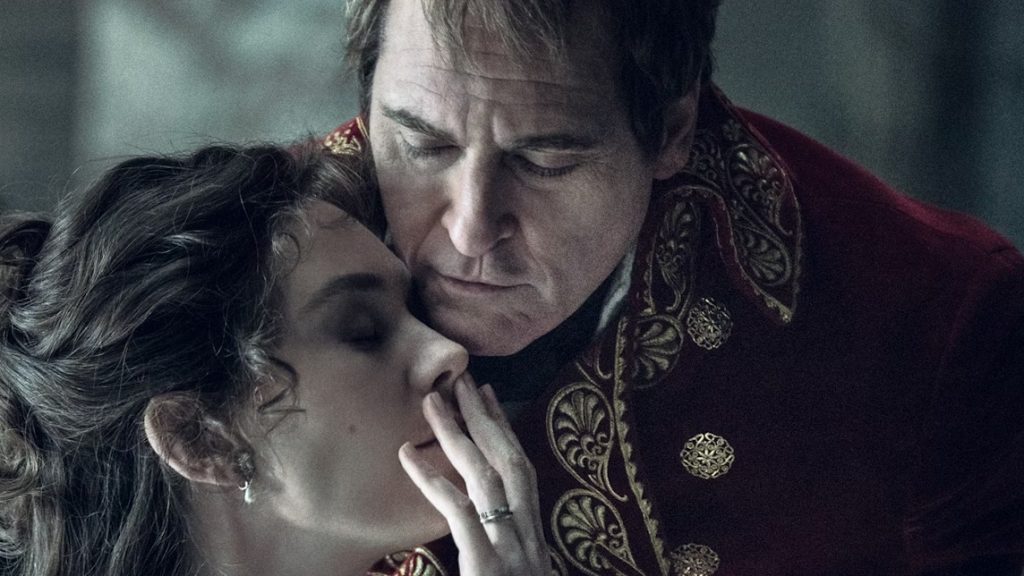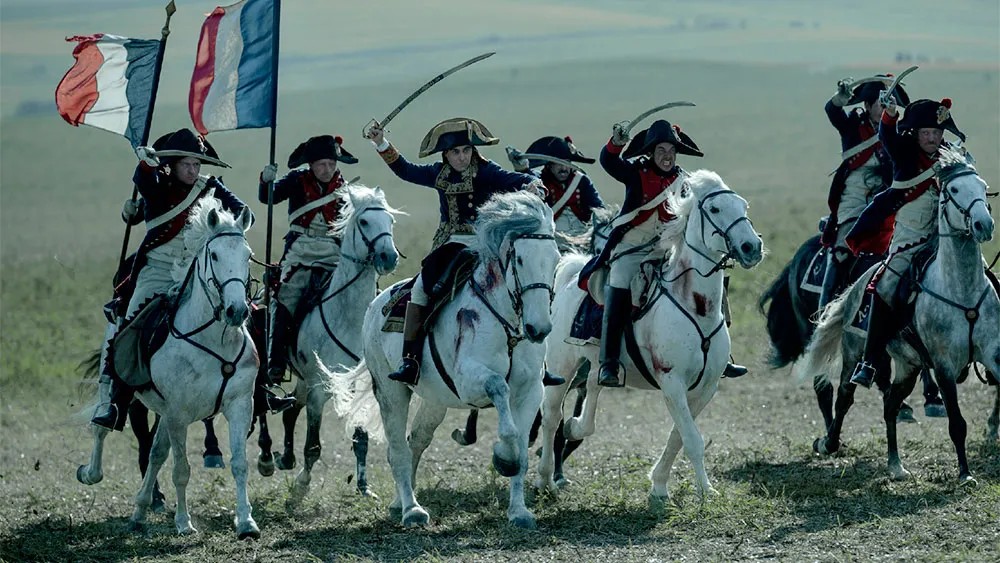
Napoleon Bonaparte’s name is rightly associated with the all-time greatest military leaders and strategists. Charlemagne, Alexander the Great, to name a few, but films inspired by these impressive men have never quite lived up to the subject matters that spawned them, and Ridley Scott’s Napoleon, starring Joaquin Phoenix as the short Corsican, entertains but suffers from its own ambition as well. The film depicts Bonaparte’s greatest military campaigns in stunning cinematic sequences, but stumbles between the fights. The end result is a good but not great film whose obvious potential is left on the battlefield.
Napoleon opens towards the tail end of the French Revolution. There are historic subtitles, which will repeat whenever important figures shows up, such as Francis I the Emperor of Austria, Arthur Wellesley the Duke of Wellington (Rupert Everett), or Lucien, Napoleon’s brother (Matthew Needham). Napoleon is a scrappy military underling loyal to the French Republic and he achieves military and political greatness by stunning more powerful armies than the nascent country’s with wily stratagems and remarkable bravery. By the end of the 1700s, he is rising stratospherically to power, including leading a coup to overthrow the corrupt French Directorate and appoint himself the leader of a three-person Council of which he is the imperious commander.
Shortly thereafter, despite prior abhorrence of the monarchy, the little man with the big ego appoints himself Emperor, famously snatching the crown from the hands of Pope Pius VII. Napoleon’s Empire eventually stretches through most of Europe, humiliating the Austrian Empire and the Prussians, turning the British away from the Continent, and invading Russia up and until the burning of Moscow. France was at war, to begin with, because the royal crowns of Europe feared that the plague of its Revolution would spread to their own countries and depose them—or, worse yet, suffer the famous fates of Louis XVI and Marie-Antoinette.
You would know little of this, however, from watching Scott’s rendition of this great man’s greatest political achievements. David Scarpa’s script ambulates endlessly between quirky historical vignettes about Bonaparte himself, and the tormented but passionate relationship with his one true love, Empress Josephine (Vanessa Kirby). Most of film’s narrative actually occurs through the leaders between the tragic lovers, whose union was doomed to failure given her inability to produce an heir to the throne. But the film’s inability to decide whether it wants to be actually called Napoleon & Josephine: A Love Story or, instead, Napoleon: Military Genius, is the principal source of imbalance.

Scott is understandably too enamored with his historical subject to resist the impulse to portray famously idiosyncratic lines or moments that add little to the emotional core of the narrative. As much as he gives a stage to the Josephine romance, he abandons it, running scurrilously from shiny object to shiny object as he marches on through the years and the known high and lowlights—the Battle of Austerlitz, the failed Russian campaign, the first abdication, the Battle of Waterloo. Check, check, check. When the two separate, what would have been the pivotal moment in Napoleon & Josephine is given short thrift.
The movie we are left with, then, is simply Napoleon. And it would be overall frustrating and dull, too, were it not for Scott’s obvious cinematic prowess. For the historical buffs and amateurs alike, the battle sequences from beginning to end are nothing short of stunning. First up is the 1793 Siege of Toulon, where Napoleon first gained military fame. There, he ousted an Anglo-Spanish occupation force that was support royal loyalists against the new Republic. Riding his signature white horses, he captures the forts and famously turns the cannons against the Royal Navy’s own ships, marking one of the historical armadas few true defeats.
During all of these historical moments and even in the smaller battles in between, Scott’s vision is rousing — a director at the height of his game. Using incredible panoramic shots, Phipps’ heart-stopping score, pristine editing by Claire Simpson, as well as enough but not too much information through Scarpa’s script, Scott shows and teaches. For the expert, seeing these battles depicted for the first time with such cinematic greatness will be no doubt a delight. For the uninitiated, you will learn it all almost instantly. Those moments are captivating and exciting, the reason one goes to the movies in the first place.
It is really too bad that Scott could not otherwise deliver on the promise of that greatness during the rest of Napeleon’s 2 hour and 35 runtime, although a four-hour director’s cut is coming. Had he settled on one tone, or on one single motif for the film, he may have outdone himself and delivered something truly member. In the end, Scott and his team craft a good film with incredible moments, and the promise of all-time greatness that ultimately and eventually eluded the great man himself.
Grade: B
Napoleon will be released by Sony Pictures and Apple TV Studios in U.S. theaters on November 22, 2023
Twitter: @jdonbirnam
Instagram: @awards_predix





